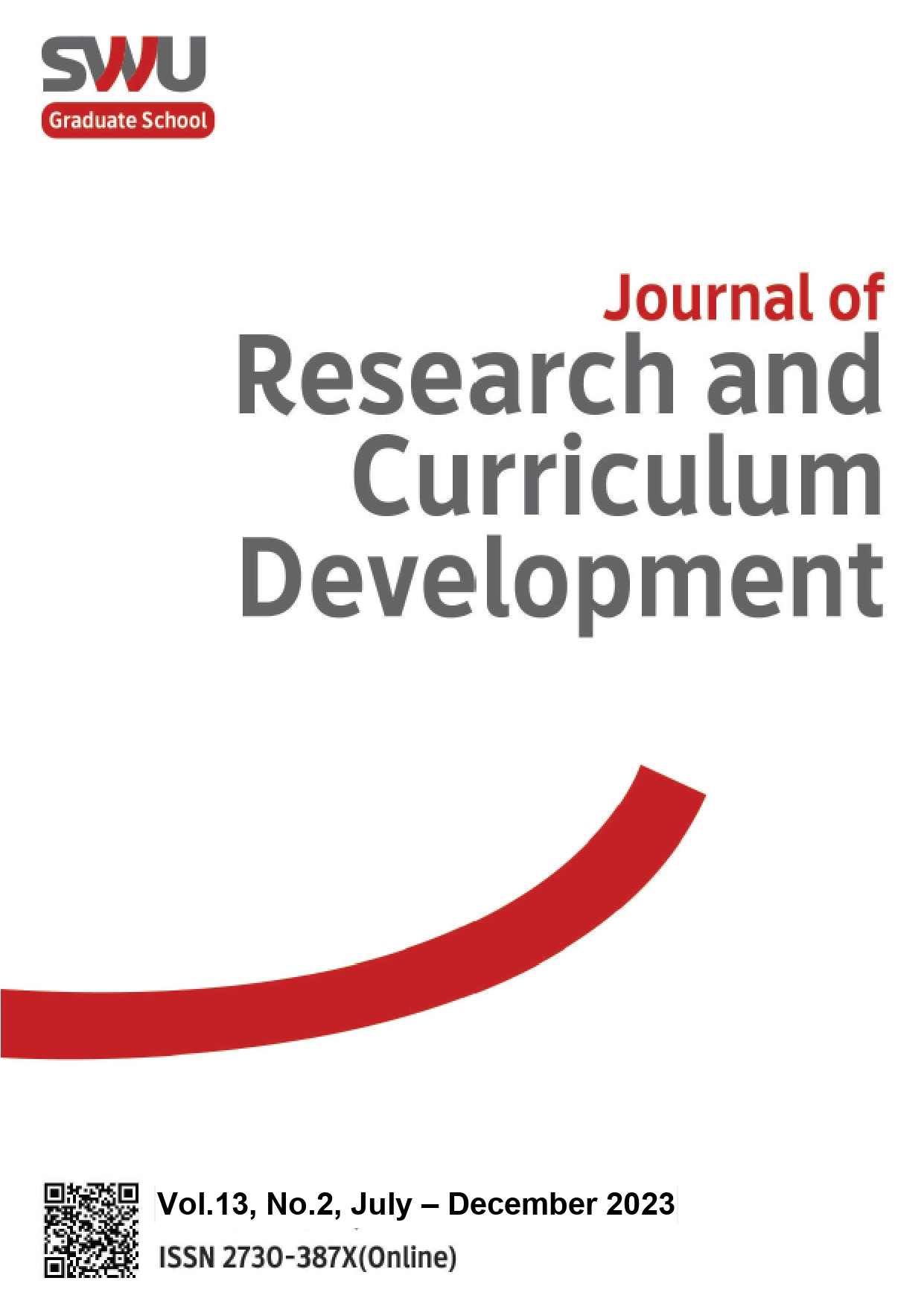Validation of a Measurement Model for Psychosocial Developmental Characteristics among Adolescent Students and the Study of Invariance across Age Groups
Abstract
This study aimed to validate the components of psychosocial development and examined the invariance of psychosocial developmental models among adolescent students of different ages. A sample group of 1,051 upper secondary school students were selected through a two-stage sampling method, and the data was collected using an identity model scale developed from the measures on the psychosocial development scale. Confirmatory factor analysis with the LISREL program was used to analyze the data. The results showed that the components of psychosocial development in upper secondary school students remained consistent across age groups, with a two-dimensional measurement model consisting of positive and negative psychosocial development, each with eight sub-issues. The measurement model was found to be consistent with empirical data, although the parameters differed between age groups. These findings suggest the need for a program to promote positive psychosocial development suitable for teenagers of both age groups. Overall, this study provides important insights into the psychosocial development of adolescent students and highlights the importance of considering age-related differences of developmental models.
References
Arnett, J. J. (2000). Emerging adulthood: A theory of development from the late teens through the twenties. American Psychologist, 55(5), 469–480. https://doi.org/10.1037/0003-066X.55.5.469
Batra, S. (2013). The psychosocial development of children: Implications for education and society—Erik Erikson in context. Contemporary Education Dialogue, 10(2), 249-278.
Bogaerts, A., Claes, L., Buelens, T., Verschueren, M., Palmeroni, N., Bastiaens, T., & Luyckx, K. (2021). Identity synthesis and confusion in early to late adolescents: Age trends, gender differences, and associations with depressive symptoms. Journal of Adolescence, 87, 106-116.
Browne, M. W. & Cudeck, R. (1993). Alternative ways of assessing model fit. In K. A. Bollen & J. S. Long (Eds.), Testing Structural Equation Models (pp. 136-62). Newbury Park, CA: Sage.
Buajun, A., Nuansithong, N., Chotchai, T., & Sawatsing, T. (2019). Resilience and stress among the 1st nursing students at faculty of nursing Chaiyaphum Rajabhat University. Journal of Graduate MCU Khonkaen Campus, 6(4), 269-281.
Chen, C. H. (2021). The roles of psychosocial developmental crisis and self-stigma in mental health among college students with disabilities. International Journal of Disability, Development and Education, 68(2), 287- 302.
Compas, B. E., Jaser, S. S., Bettis, A. H., Watson, K. H., Gruhn, M. A., Dunbar, J. P., & Williams, E. K. (2017). Coping, emotion regulation, and psychopathology in childhood and adolescence: A meta-analysis and narrative review. Psychological Bulletin, 143(9), 939–991. https://doi.org/10.1037/bul0000110
DeMoor, E. L., Sijtsema, J. J., Weller, J. A., & Klimstra, T. A. (2022). Longitudinal links between identity and substance use in adolescence. Self and Identity, 21(1), 113-136.
Eccles, J. S., & Roeser, R. W. (2011). Schools as developmental contexts during adolescence. Journal of Research on Adolescence, 21(1), 225–241. https://doi.org/10.1111/j.1532-7795.2010.00725.x
Erikson, E. H. (1959). Childhood and Society. Norton & Co.
Erikson, E. H. (1968). Identity: Youth and Crisis. Norton & Co.
Green, M., & Piel, J. A. (2002). Theories of Human Development: A Comparative Approach. Boston, MA: Allyn & Bacon.
Haight, M. G. (2006). Psychometric properties of Hawley's measures of psychosocial development: A critical analysis (Doctoral dissertation).
Hair, J. F., Black, W. C., Babin, B. J. & Anderson, R. E. (2010). Multivariate Data Analysis, (7th Edition). Pearson, New York.
Hawley, G. A. (1988). MPD: Measures of Psychosocial Development. Florida: Psychological Assessment Resources, Inc.
Jöreskog, K. G. & Sörbom, D. (1996). LISREL 8: User’s reference guide. Chicago: Scientific Software International.
Lewis-Beck M. S. (1989). Factor Analysis & Related Techniques. Singapore: SAGE Publications Inc.
Marcia, J., & Josselson, R. (2013). Eriksonian personality research and its implications for psychotherapy. Journal of Personality, 81(6), 617-629.
Maree, J. G. (2022). The psychosocial development theory of Erik Erikson: Critical overview. The Influence of Theorists and Pioneers on Early Childhood Education, 191(7-8), 119-133.
Meca, A., Allison, K., Cruz, B., Ayers, K., Webb, T., & Patel, P. (2023). Who am I? Identity and its implications for health and psychosocial functioning. In B. Halpern-Felsher (Ed.), Encyclopedia of Child and Adolescent Health (1st ed., pp. 64-78). Academic Press. doi:10.1016/B978-0-12-818872-9.00111-4.
Rutter, M. (1999). Resilience concepts and findings: Implications for family therapy. Journal of Family Therapy, 21(2), 119-144.
Shaffer, D. R., & Kipp, K. (2007). Developmental Psychology: Childhood & Adolescence, (7th Edition.). Belmont: Thomson Wadsworth.
Velicer, W. F., & Jackson, D. N. (1990). Component analysis versus common factor analysis: Some issues in selecting an appropriate procedure. Multivariate Behavioral Research, 25(1), 1-28.
Warunwutthi, N., Wattananonsakul, S., & Ekpanyaskul, C. (2022). Effectiveness of a growth mindset counseling program to enhance student resilience in a public autonomous university in Thailand. Journal of Research and Curriculum Development, 12(1), 58-66.
Wattananonsakul, S., Suttiwan, P., & Iamsupasit, S. (2018). Pathways to smoking and drinking: the role of family functioning, supportive parenting, self-control, risk and protective factors in Thai adolescents. Journal of Health Research, 24(3), 135–142. Retrieved from https://he01.tci-thaijo.org/index.php/jhealthres/article/view/156825
Wattananonsakul, S., & Tuicomepee, A. (2014). Protective predictors of smoking intention among lower secondary school students in Bangkok, Thailand. Journal of Population and Social Studies, 22(2), 158-173. Doi 10.14456/jpss.2014.11
Zhang, L. (2015). Erikson's theory of psychosocial development. In J. D. Wright (Ed.), International Encyclopedia of the Social & Behavioral Sciences (Second Edition) (pp. 938-946). Elsevier. ISBN 9780080970875. https://doi.org/10.1016/B978-0-08-097086-8.23200-5.
Downloads
Published
How to Cite
Issue
Section
License

This work is licensed under a Creative Commons Attribution-NonCommercial-NoDerivatives 4.0 International License.


